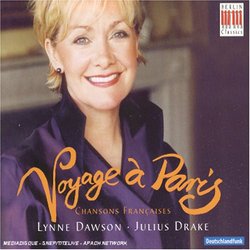| All Artists: Emmanuel Chabrier, Ernest Chausson, Henri Duparc, Gabriel Faure, Reynaldo Hahn, Francis Poulenc, Lynne Dawson, Julius Drake Title: Lynne Dawson - Voyage Ó Paris (Chansons franšaise) Members Wishing: 0 Total Copies: 0 Label: Berlin Classics Original Release Date: 1/1/2008 Re-Release Date: 11/29/2005 Genres: Pop, Classical Styles: Vocal Pop, Opera & Classical Vocal, Chamber Music, Historical Periods, Classical (c.1770-1830), Modern, 20th, & 21st Century Number of Discs: 1 SwapaCD Credits: 1 UPC: 782124175825 |
Search - Emmanuel Chabrier, Ernest Chausson, Henri Duparc :: Lynne Dawson - Voyage Ó Paris (Chansons franšaise)
 | Emmanuel Chabrier, Ernest Chausson, Henri Duparc Lynne Dawson - Voyage Ó Paris (Chansons franšaise) Genres: Pop, Classical |
Larger Image |
CD Details |
CD ReviewsSensitive accounts of intimate French songs Terry Serres | Minneapolis, MN United States | 04/25/2007 (4 out of 5 stars) "In an age of complete editions and other forms of elaborate programming, it is a delight to sit back and enjoy this somewhat random selection of beautiful songs, mostly familiar with a couple of rareties thrown in.
Dawson's voice is big and mature-sounding, with a burnished tone and exceptional support. What's striking is how she uses these gifts: More than linguistic nuance, it is her vocal strengths that lend these performances their interpretive finesse. Her dynamic control, her supple instrument and plush sound give her great expressive power. I marvel at how much a sustained pianissimo, instead of a feeble drop-off, can add to a song's effectiveness. It's a subtle distinction, but she relies more on technique (portamento, rubato) than on getting inside the song texts. I don't mean to say that she is interpretively weak, or indulges in producing a merely beautiful sound. Indeed, these are readings of sensitivity and insight. But it's not quite how the French approach the mélodie. She is more in line with Jessye Norman and Susan Graham than Ameling or Gens. While her French diction isn't wholly idiomatic, it is always astute and she masters even the peculiar prosody of Fauré's "Mandoline." It is somewhat surprising that half the songs on the disk are by Poulenc, when Chausson and Duparc would be more natural fits. Nonetheless, Dawson is quite at home with all six composers in the program: the three already mentioned plus Faure, Chabrier, and Hahn. On a few songs, she and her accompanist tend toward slowish tempi, but her secure voice and the duo's rhythmic subtlety make it work. Hahn's "A Chloris" would be impossibly lugubrious without Dawson's admirable breath control to expand the phrasing. With Poulenc's "Nous voulons une petite soeur" she opts to tell a story rather than deliver a patter-song, and the results are just as delightful as other performances that are more overtly comic. On the hand, Poulenc's "Fancy" is inexplicably wan. That cavil aside, most of the songs are splendidly done, from the rapture of "Après un rêve" and the heartbreak of "Le temps des lilas" to the schmaltz of "Les chemins de l'amour" and the seductiveness of "Violon." " |
